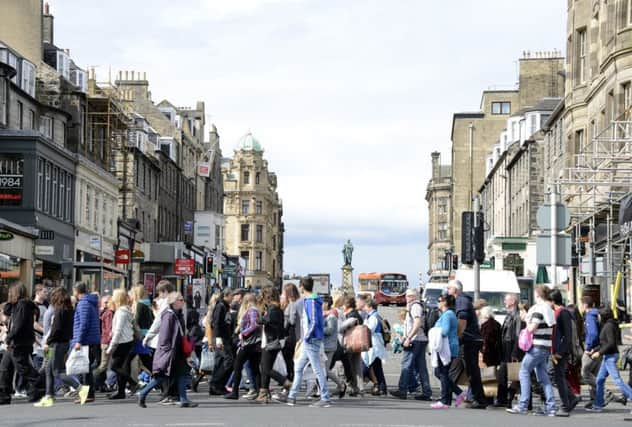SNP tax rises could harm struggling High Street, retailers say


Finance secretary Derek Mackay’s proposal to increase income tax amid strong signs that local authorities are set to increase council tax has led to the Scottish Retail Association (SRC) saying businesses will have to work hard to attract consumer spending.
The warning was made by Ewan MacDonald-Russell, head of policy and external affairs of the Scottish Retail Consortium (SRC), as the organisation announced disappointing sales for January.
Advertisement
Hide AdAdvertisement
Hide AdPublished today, the SRC-KPMG Scottish Retail Sales Monitor for January showed Scottish sales fell by 0.7 per cent on a like-for-like basis compared with January 2017.
Mr MacDonald-Russell said: “All the evidence is that consumers continue to be careful with their spending at a time of uncertainty. With income and council tax rises coming in later this spring, along with inflation and potential interest rate rises, retailers will have to continue to work hard to encourage consumer spending in the months ahead.”
Other business organisations warned of the negative impact of tax rises.
Charandeep Singh, head of external relations at Scottish Chambers of Commerce, said: “January is rarely a big-spending month, but these sluggish retail figures give good reason to believe that Scottish consumers are being extra cautious in a period of uncertainty, especially with the likelihood of imminent interest rate rises around the corner.
“On top of that, the Scottish Chambers of Commerce has warned repeatedly about the threat of Scotland being perceived as a relatively high-tax economy, and how that impacts on business investment and on consumer behaviour. We will be watching shoppers’ behaviour closely in the months ahead for signs of restricted consumer spending and tightening disposable income.”
Scottish Conservative shadow finance secretary Murdo Fraser said: “There will be many unintended consequences to the SNP’s high-tax agenda. One will be placing limitations on consumers, who quite simply will have less of their own money to spend.
“That clearly means retailers will suffer, which in turn has a negative impact on the economy and tax receipts. It’s clear the SNP embarked on these tax hikes without giving a second thought to the high street.”
Mr Mackay’s budget will see a reform of income tax which will see Scots who earn more than £26,000 pay more.
Advertisement
Hide AdAdvertisement
Hide AdIn addition, local authorities have signalled that most intend to raise council tax by 3 per cent this year.
According to the SRC-KPMG figures for January, total sales – when not calculated on a like-for-like basis – decreased by 0.1 per cent in Scotland compared with the same period last year.
Like-for-like calculations discount transactions made in shops open for less than a year in an attempt to make comparisons more meaningful.
When sales were adjusted for deflation, measured at 0.5 per cent, the January sales figure was recalculated it came to an increase of 0.3 per cent.
Total food sales in January increased 4.2 per cent versus January 2017, but total non-food sales declined 3.6 per cent compared to January 2017.
Mr MacDonald-Russell said: “January is always a challenging month for retailers after the vital Christmas period, and 2018 was no different.
“Overall there was a real-terms rise in sales of 0.3 per cent but below the three and 12 month averages. As with previous months, the rise in food sales is the driving force behind this growth, with the 4.2 per cent rise bringing the 12-month average to the highest point in over six years.
“That rise is still being lifted by food price inflation, but traditional Scottish products did well, including strong haggis sales as customers toasted the Bard of Ayrshire.”
Advertisement
Hide AdAdvertisement
Hide AdCraig Cavin, head of retail in Scotland at KPMG, said: “Retailers will be glad to see the back of January.
“Although it wasn’t as bleak as some predicted, overall sales still declined by 0.1 per cent. Some retailers tempted customers into store using discounting and the introduction of new season lines, yet non-food sales declined 3.6 per cent compared to last year.
“Sales will have been impacted by both the tightening of purse strings post-Christmas, as well as a flurry of snowstorms dissuading shoppers.”
A Scottish Government spokesperson said: “A successful and vibrant retail sector in Scotland, particularly in food and drink where we have an enviable global reputation, is vitally important to our economy and we continue to do whatever we can to support retailers.
“Our proposals will make the income tax system fairer and more progressive, ensuring that 70 per cent of Scottish taxpayers will pay less income tax next year if their income remains the same. Indeed, 55 per cent of Scottish income tax payers will pay less tax next year than if they lived elsewhere in the UK.”